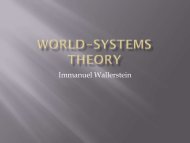The rationalization of consumption - faculty.rsu.edu
The rationalization of consumption - faculty.rsu.edu
The rationalization of consumption - faculty.rsu.edu
Create successful ePaper yourself
Turn your PDF publications into a flip-book with our unique Google optimized e-Paper software.
George Ritzer’s
George Ritzer
Note:<br />
This presentation is based on the theories <strong>of</strong> George<br />
Ritzer as presented in his books listed in the<br />
bibliography. A more complete summary <strong>of</strong> Ritzer’s<br />
theories (as well as the theories <strong>of</strong> other macrosocial<br />
theorists) can be found in Macrosociology:<br />
<strong>The</strong> Study <strong>of</strong> Sociocultural Systems by Frank W.<br />
Elwell. If you would like to receive a .pdf file <strong>of</strong> the<br />
chapter on Ritzer, please write me at<br />
felwell@<strong>rsu</strong>.<strong>edu</strong> and put Ritzer.pdf in the subject<br />
line.
Rationalization<br />
<strong>The</strong> concept <strong>of</strong> <strong>rationalization</strong> was developed<br />
by Max Weber. It is the application <strong>of</strong> logic,<br />
observation, and science to achieve<br />
desired ends. <strong>The</strong> major characteristics <strong>of</strong><br />
the process are efficiency, predictability,<br />
calculability, and control.
Rationalization<br />
Weber saw bureaucracy as the prime<br />
example <strong>of</strong> the <strong>rationalization</strong> process<br />
applied to human organizations. <strong>The</strong>se<br />
organizations are hierarchical in nature,<br />
and controlled through directives from the<br />
top <strong>of</strong>fices. Written rules define the<br />
responsibilities and authorities <strong>of</strong> <strong>of</strong>fice;<br />
there is a detailed division <strong>of</strong> labor; and<br />
staffing and promotion are done through<br />
achievement.
Rationalization<br />
While Ritzer sees bureaucracy as continuing<br />
in the world today, he believes that<br />
McDonalds is a more effective model <strong>of</strong> the<br />
<strong>rationalization</strong> process applied to human<br />
organization. Ritzer did not coin the term<br />
“McDonalization” to describe a new<br />
process, only to reach a broader audience<br />
and to more effectively illustrate the<br />
<strong>rationalization</strong> process.
Rationalization<br />
What are the bureaucratic characteristics <strong>of</strong><br />
the fast food restaurant? <strong>The</strong>re are many.<br />
<strong>The</strong>y have a very detailed division <strong>of</strong> labor.<br />
Unlike traditional restaurants that rely on<br />
chefs or cooks, the fast food restaurant<br />
relies on unskilled laborers who are<br />
assigned a simple task that is endlessly<br />
repeated. <strong>The</strong>y are able to do this because<br />
these restaurants have a very restricted<br />
menu.
Rationalization<br />
Much <strong>of</strong> the food preparation is done in<br />
factories away from the restaurant. <strong>The</strong><br />
hamburger patties and chicken nuggets<br />
are formed <strong>of</strong>f-site, the fries are pre-cut,<br />
and the buns are baked and shipped out<br />
to the restaurants for final cooking and<br />
assembly.
Rationalization<br />
<strong>The</strong> preparation <strong>of</strong> food on site is broken<br />
down into simple steps, the restaurant<br />
employs technologies to take the<br />
variability and guesswork out <strong>of</strong><br />
preparation. Rather than waitresses, the<br />
restaurant employs counter people and<br />
uses cash registers with pictures instead<br />
<strong>of</strong> prices.
Rationalization<br />
Rather than busboys, the restaurant<br />
encourages customers to clear their own<br />
tables. To move customers quickly<br />
through the dining experience,<br />
restaurants provide finger foods that can<br />
be rapidly eaten and uncomfortable<br />
seating that discourages lingering over<br />
the meal.
Rationalization<br />
To make it even more efficient, a recent<br />
innovation has been the drive-through<br />
where the customer is not even given a<br />
table is required to remove the waste<br />
from the premises as well.
Rationalization<br />
<strong>The</strong> attractions <strong>of</strong> fast food restaurants to<br />
consumers, Ritzer points out, are many.<br />
<strong>The</strong>ir efficiency combined with the<br />
volume <strong>of</strong> their business allows them to<br />
give more food for the money. <strong>The</strong>y<br />
serve very predictable fare. <strong>The</strong> food<br />
has been designed to appeal to a broad<br />
audience.
Rationalization<br />
While no one will anticipate a gourmet<br />
feast, you need not fear spoiled or badtasting<br />
food, or outrageous prices,<br />
either. By design, the Big Mac you buy<br />
in San Francisco is likely to be virtually<br />
identical to the one purchased in Tulsa<br />
or New York City.
Rationalization<br />
This predictability is ensured through<br />
centralized control, exercised through<br />
written rules, regulations, and<br />
proc<strong>edu</strong>res as well as through the use <strong>of</strong><br />
technology.
Rationalization<br />
Another attraction <strong>of</strong> fast food is that the<br />
innovation fits in with modern lifestyles.<br />
<strong>The</strong> growth <strong>of</strong> fast food coincides with<br />
1. <strong>The</strong> rise <strong>of</strong> the automobile culture.<br />
2. <strong>The</strong> increase in women working outside<br />
the home.<br />
3. <strong>The</strong> increased pace <strong>of</strong> modern life, and<br />
4. <strong>The</strong> decline <strong>of</strong> the family meal (<strong>of</strong> which<br />
fast food is both a cause and effect).
Rationalization<br />
Ritzer is also in agreement with Weber in<br />
seeing Capitalism as providing much <strong>of</strong> the<br />
driving force promoting the <strong>rationalization</strong><br />
process. In its drive for pr<strong>of</strong>it—which is its<br />
reason for being—capitalism pushes the<br />
individual to acquire marketable skills, work<br />
at inhumane jobs for wages, and above all<br />
consume.
Rationalization<br />
Although the forces <strong>of</strong> <strong>rationalization</strong> and<br />
capitalism are separate, Ritzer writes, they<br />
are also very much intertwined. Pr<strong>of</strong>it<br />
provides a motive for millions <strong>of</strong><br />
entrepreneurs (and wannabes) to adopt<br />
technologies and techniques that can lower<br />
the costs <strong>of</strong> producing, delivering, or selling<br />
products or service to consumers.
Rationalization<br />
Chief among these techniques are the<br />
detailed division <strong>of</strong> labor thus breaking jobs<br />
up into simple steps, the replacement <strong>of</strong><br />
labor with technology, setting the pace <strong>of</strong><br />
work, and close monitoring <strong>of</strong> employee<br />
performance—all <strong>of</strong> which are part <strong>of</strong> the<br />
<strong>rationalization</strong> process.
Rationalization<br />
<strong>The</strong> <strong>rationalization</strong> <strong>of</strong> the economy to<br />
maximize pr<strong>of</strong>it is in the interests <strong>of</strong><br />
capitalists, and it is capitalism that<br />
provides much <strong>of</strong> the drive (though not<br />
all) behind the <strong>rationalization</strong> process.
Rationalization<br />
Ritzer also points out that <strong>rationalization</strong> is<br />
driven by our cultural value system, that<br />
is, <strong>rationalization</strong> and its drive for<br />
efficiency has come to be seen as a<br />
value in-and-<strong>of</strong>-itself.
Rationalization<br />
It is the continuing development <strong>of</strong><br />
<strong>rationalization</strong> and capitalism that has<br />
led to the creation <strong>of</strong> culture <strong>of</strong> hyper<strong>consumption</strong><br />
in America. So important<br />
has <strong>consumption</strong> become, Ritzer<br />
argues, that America is now “better<br />
characterized by <strong>consumption</strong> than<br />
production.”
Rationalization<br />
With the expansion <strong>of</strong> <strong>rationalization</strong>, the<br />
spread <strong>of</strong> consumer society is threatening<br />
to overwhelm indigenous cultures around<br />
the world.
George Ritzer<br />
For a more extensive discussion <strong>of</strong> the<br />
theories <strong>of</strong> George Ritzer refer to<br />
Macrosociology: the Study <strong>of</strong> Sociocultural<br />
Systems. For an even deeper understanding,<br />
read from the bibliography that follows.
Bibliography<br />
Elwell, F. (2009), Macrosociology: <strong>The</strong> Study<br />
<strong>of</strong> Sociocultural Systems. Lewiston: Edwin<br />
Mellen Press.<br />
Ritzer, G. (1975). Sociology: A Multiple<br />
Paradigm Science. Boston: Allyn and<br />
Bacon, Inc.<br />
Ritzer, G. (2004). <strong>The</strong> Globalization <strong>of</strong><br />
Nothing. Thousand Oaks: Pine Forge<br />
Press.
Bibliography<br />
Ritzer, G. (1993). <strong>The</strong> McDonaldization <strong>of</strong><br />
Society. Newbury Park: Pine Forge Press.<br />
Ritzer, G. (2007, August 25). About Ritzer. (F.<br />
Elwell, Interviewer)<br />
Ritzer, G. (2007). Being (George Ritzer) and<br />
Nothingness: An Interview. (S. Dandaneau,<br />
& R. Dodsworth, Interviewers)
Bibliography<br />
Ritzer, G. (2005). Enchanting a Disenchanted<br />
World: Revolutionizing the Means <strong>of</strong><br />
Consumption (2nd ed.). Thousand Oaks:<br />
Pine Forge Press.<br />
Ritzer, G. (1995). Expressing America: A<br />
Critique <strong>of</strong> the Global Credit Card Society.<br />
Thousand Oaks: Pine Forge Press.<br />
Ritzer, G. (n.d.). George Ritzer Home Page.<br />
Retrieved August 20, 2007, from University<br />
<strong>of</strong> Maryland:<br />
http://www.bsos.umd.<strong>edu</strong>/socy/ritzer/





